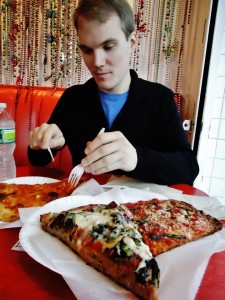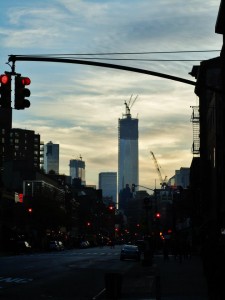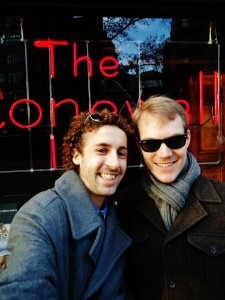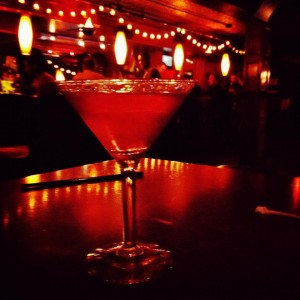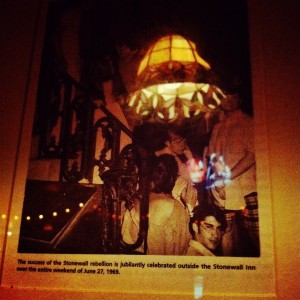I was a freshman in high school when Matthew Shepard was beaten and left to die in the coldness of Laramie, Wyoming. News of his attack trickled down through my small town’s news and gossip mills—the entire twisted, tragic narrative framed as something problematic and salacious. Few discussed it openly, and those who did defaulted to the deeply flawed victim-blaming mentality: he had it coming, after all. So I policed myself even more, venturing further into my closet’s shadows.
I’d known I was different since I was eight. Without the vocabulary to really capture what I knew, I entertained the thought that I had some innate superhero ability, or some amazingly unique, mutant-like advantage. But it wasn’t until my senior year of high school that I quietly admitted to myself that, in all likelihood, I was gay. Only one classmate actually came out, and he—and his family—were smeared across the front page of the local paper, and he and his boyfriend were given wide berth at the prom. From the periphery of the dance floor, I’d watched them watch each other, my eyes falling to their clasped hands. That’s what I wanted. Still, I never verbalized my truth, made it real, until I was nearly finished with college.
***
The Pulse massacre last year ripped through the LGBTQIA+ community; I was visiting my family in Alabama, and walked into the living room—eyes still bleary from sleep—to my parents glued to the screen, their faces screwed up in horror. My heart rate quickened and I started sweating and I walked out the front door. I kept going for a mile, circling through our family’s land and ending up back at an old, shattered playground my grandparents had helped my parents build. My ex-husband and I were in the middle of separating, and would, weeks after I returned, decide to divorce. But still, we talked through the sheer tragedy of this latest news, hearing our words echo back to one another over the phone, the world suddenly feeling so much smaller, even more fragile.
Months later, as the malignancies of the 2016 election revealed the extent to which this nation is still so deeply racist and misogynistic, I felt a hollowness I’d experienced all those closeted years ago. Again, the future felt so fragile—knowing the ensuing violence espoused from on high would be mapped more vehemently and pointedly onto people of color, people with disabilities, LGBTQIA+ people, and women.
***
So many people have been lost over the past year, the vast majority of whom being people of color.
I made the mistake of reading an article today that advocated for dissolving National Coming Out Day. The author was a cis, white, gay man whose utter lack of history and severe cognitive dissonance made me cringe. I disagreed with every single one of his points. Now more than ever, LGBTQIA+ people must be visible; we must show that we aren’t going anywhere, that the future will only get browner, queerer, and—mother goddesses be willing—more female.
Reading his suggestions, I thought back to when I came out over 12 years ago. It was a crucial, life-saving decision; the act of bringing voice to what I’d long since known quieted the malevolent voices in my mind, and stemmed the self-harming actions and suicidal thoughts that’d skewed my perception of what my future would look like. In coming out, I wrested power back from those whose narrow worldviews kept me barricaded within my private torture chamber. My mind could only take so much trauma before it went into a numbing survival mode, blunting senses and joy—clouding my mind’s eye with a grayed shroud devoid of hope.
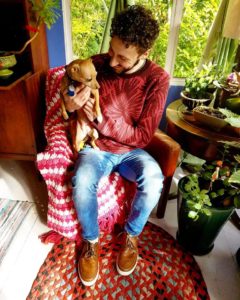
Being out and visible for anyone is a courageous exercise. And for me, I’m quickly reminded of how much privilege I carry as a white, cis, gay man—the relative security I’m ensured that is so far out of reach for my trans* family and friends, especially trans* women of color.
Dark, uncertain times necessitate that we band together; the more closely bound we are—the more vigilant and outspoken we are, the more protective we are of our neighbors who aren’t afforded the same privileges—the better equipped we’ll be to combat the growing chill, the biting hatred of legislative rollbacks.
This National Coming Out Day, I hope more people come out and don’t tacitly endorse heteronormative behaviors that inform dangerous, violent actions.
Each of us is endowed with a moral compass. And it’s up to us to reorient the national narrative—even by taking slow, iterative steps in times like these—to advance and promote a future in which we’re all recognized as people deserving of basic, inalienable rights.
We must be confident and authentic—and wield those sources of power compassionately.

